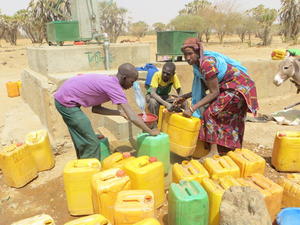Monitoring and awareness raising have helped the commune of Gorgadji collect fees for preventive maintenance of waterpoints and take steps towards sustainable water supply services.
Published on: 12/05/2014
In Burkina Faso, user responsibility for and participation in service management are fundamental principles of the national rural water supply policy. Users pay contributions to Water Users Committees (Associations des Usagers de l’Eau- AUEs in French) to insure the water services are ongoing. AUEs tasks include reparations after a breakdown and payment for the preventive maintenance of facilities.
Every year, each water users’ committee pays a fee of 10,000F CFA (around US $20) to the commune for each borehole it manages. With the collected annual fees, the commune organizes preventive maintenance twice a year for each borehole. However, due to lack of monitoring and adequate information, users become distrustful, they stop paying their fees, resulting in improper facility maintenance and more frequent breakdowns.
In 2012, the commune did not implement the preventive maintenance of boreholes. Bassirou Ouédraogo, general secretary of the commune of Gorgadji admits: ‘We had planned for hand pump mechanics to go around and carry out preventive maintenance, but the AUE failed to give us the user fees, so we were unable to undertake the maintenance’.

Fortunately, things are changing in Gorgadji: with the implementation of a monitoring system developed by IRC within the context of the USAID WA-WASH programme, service monitoring is improving. Monitoring and evaluation is being conducted by the commune itself, supported by IRC and the Regional Directorate of Water, Water Works and Sanitation (DREAHA) of the Sahel region.
The first monitoring cycle took place between October and December 2013. Five categories of key indicators were monitored: technical performance, financial performance, governance, activities and results. Before launching the data collection phase, IRC and DREAHA trained community technicians and municipal water and sanitation committee members (CCEA, in French) to use data collection tools.
The data collection teams supported the commune with monitoring activities and helped the water users’ committees to address problems. They also encouraged them to take more initiatives, such as setting up meetings of the executive boards, taking over the management of community boreholes controlled by individuals, collecting user fees, organising general membership meetings and repairing breakdowns.
All actors agreed that ignorance and lack of information were the root cause of non-payment of water fees. Therefore, it was decided that the commune would hold information and awareness-raising sessions. The mayor, members of the municipal council and the CCEA were mobilised to implement this plan. The results achieved after only three months were quite remarkable: by December 2013, the fees of 30% of the boreholes had been paid. The water users' committees are no longer reluctant to pay their bill.
‘We now know that the fees we are charged by the commune are used to prevent break-downs. We are no longer opposed to paying them’, confirms Aissata Dicko, treasurer of the water users' committee of the village of Bounougnoudji. Monitoring was critical in this behaviour change process. Sadio Ouédraogo, mayor of Gorgadji is pleased with the results: ‘Without monitoring data, it was difficult to identify the bottlenecks. Since the implementation of the monitoring project, we have recovered 400.000F CFA, whereas before, the cash box remained empty.’ He urges all stakeholders to continue the monitoring activities in order to achieve sustainable water supply services for the whole commune. The first round of preventive maintenance is planned for June 2014.